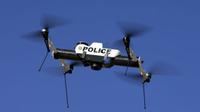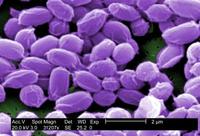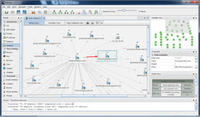-
New high security police barracks opens in Maryland

The new $11.3 million Maryland State Police Barracks has opened up in Hagerstown, Maryland; the facility features many security measures and can serve as a command center in the event of a major emergency
-
-
As domestic use of drones grows, privacy advocates worry

Small aerial drones are moving from the battlefield to local communities, and the pace grows faster; during the next year, drones may be used in cities and towns to help fight crime and keep officers out of danger; their use would save on the cost of fuel for police helicopters; some would feel safer as a result, but activists worry that this could be the beginning of a systemic invasion of privacy
-
-
Border Patrol relies in obsolescent surveillance gear
An Obama administration plan to update equipment the Border Patrol is using did not materialize, and now officials are concerned about outdated equipment putting the lives of agents in danger; the sensors now in use were originally said to be able to put Border Patrol agents in position to capture 90 percent of border invaders, but the DHS inspector general determined that just 4 percent of the alarms were confirmed cases of smugglers and border crossers; 34 percent were false alarms, and 62 percent were undetermined
-
-
Syracuse University, city police to join forces to make area safer
The Syracuse Police Department (SPD) has agreed to join forces with Syracuse University’s Department of Public Safety (DPS) to increase the police presence on university ground and the surrounding communities
-
-
Jordan foils al Qaeda terror plot against Western embassies, shopping centers

Jordan said its security services have arrested eleven militants who have planned attacks on Western diplomatic missions, shopping malls, and other targets in the capital Amman; this was the first terror plot is to be uncovered in Jordan since an al Qaeda bombing attack on three hotels in Amman almost seven years ago killed sixty people
-
-
Twenty-year anniversary of U.S. last full-scale nuclear test
The first U.S. nuclear test, code named Trinity, took place in southern New Mexico forty-seven years earlier, on 16 July 1945; in all, the United States conducted 1,030 nuclear tests – the last one, code-named Divider, took place twenty years ago, on 23 September 1992
-
-
Hezbollah drone represents changing technological landscape for Israel
Israel’s air defenses worked just fine in handling the drone launched by Hezbollah last week: the drone was picked up by Israeli surveillance as it was launched from southern Lebanon, then tracked as it flew south over the Mediterranean; it was allowed to enter Israeli air space so that after it was shot down, its remains could be collected and analyzed; still, the incident made many Israelis sit up and take notice; Israel, a country which has pioneered the use of UAVs as an integral part of military operations and which has held a monopoly on operating drones in the region, was forced to realize that is adversaries, too, now had access to the technology
-
-
Researchers find anthrax can grow and reproduce in soil

Anthrax has the unexpected ability to grow and reproduce while lurking in soil — increasing the deadly bacteria’s chances to infect cattle and other mammals; researchers have found that the spores can attack a common soil and water amoeba, Acanthamoeba castellanii, turning these single-celled organisms into anthrax incubators
-
-
Bangladeshi national arrested for trying to blow up the Federal Reserve Bank
A 21-year-old Bangladeshi national, Quazi Mohammad Rezwanul Ahsan Nafis, was arrested by FBI agents after he attempted to detonate what he believed was a 1,000-pound bomb in front of the Federal Reserve Bank building on Liberty Street, Manhattan; the device, however, was a fake provided to him by undercover FBI agents who had been tracking his activity, the FBI’s Joint Terrorism Task Force said Wednesday afternoon
-
-
Sen. Rockefeller asks Fortune 500 CEOs for cybersecurity best practices

Last month, Senator Jay Rockefeller (D-West Virginia) sent a letter to the CEOs of fortune 500 companies asking them what cybersecurity practices they have adopted, how these practices were adopted, who developed them, and when they were developed; many saw Rockefeller’s letter as an admission that the Obama administration does not have a basis for trying to impose cybersecurity practices on the private sector through the Cybersecurity Act of 2012, now stalled in Congress
-
-
New app uses scattered public information to put together a digital footprint of individuals, organizations

A new app application can collect scattered online clues to provide a picture of individuals or organizations; the application draws on public data sources in order to put together a graphical digital footprint
-
-
New book discusses on immigration issues in Arizona
In a new book, State Out of the Union: Arizona and the Final Showdown over the American Dream, JeffBiggers that SB 1070 has changed the way people look at Arizona, and that the history of revolutionary politics in the state has been forgotten; Biggers wants people to remember the political figures of the past – for example, the liberal Morris K. Udall and the conservative Barry Goldwater — who made Arizona prominent in U.S. history and politics
-
-
U.S. to help Libya create an elite anti-terror force

The Obama administration has received a tacit Congressional approval to reallocate about $8 million from Pentagon operations and counterterrorism aid budgeted for Pakistan to Libya, for the purpose of building an elite Libyan force over the next year – a force that could ultimately rise to about 500 troops; the post-Qaddafi Libyan government does not have meaningful military and law enforcement forces at its command. Instead, it relies on several armed militias to maintain law and order in different parts of the country
-
-
Evidence suggests that three-strikes law does not deter crime
Contrary to what police, politicians, and the public believe about the effectiveness of California’s three-strikes law, researchers have found that the get-tough-on-criminals policy voters approved in 1994 has done nothing to reduce the crime rate; a criminologist finds that decline in alcohol consumption is most responsible for decreasing crime rate
-
-
Different technologies aim to replace dogs as explosives detectors
Bomb-sniffing dogs are the best and most popular way for airport security quickly to detect anyone planning to bring explosives to an airport; scientists are trying to change that; Dr. Denis Spitzer and his colleagues, for example, are working on a sensor that will detect vapors of TNT and other explosives in very faint amounts; the device they are trying to create would replace dogs as the top bomb detecting method in the field
-
More headlines
The long view
Preventing Another 'Jan. 6' Starts by Changing How Elections Are Certified, Experts Say
The 2024 presidential election may be a rematch between President Joe Biden and former President Donald Trump, but preventing a repeat of Jan. 6, 2021 — when false claims of a stolen election promoted by Donald Trump and his allies led to an insurrection at the U.S. Capitol —will be top of mind this election year. Research finds broad support among public for nonpartisan certification commissions.
States Rush to Combat AI Threat to Elections
This year’s presidential election will be the first since generative AI became widely available. That’s raising fears that millions of voters could be deceived by a barrage of political deepfakes. Congress has done little to address the issue, but states are moving aggressively to respond — though questions remain about how effective any new measures to combat AI-created disinformation will be.
Chinese Government Hackers Targeted Critics of China, U.S. Businesses and Politicians
An indictment was unsealed Monday charging seven nationals of the People’s Republic of China (PRC) with conspiracy to commit computer intrusions and conspiracy to commit wire fraud for their involvement in a PRC-based hacking group that spent approximately 14 years targeting U.S. and foreign critics, businesses, and political officials in furtherance of the PRC’s economic espionage and foreign intelligence objectives.
European Arms Imports Nearly Double, U.S. and French Exports Rise, and Russian Exports Fall Sharply
States in Europe almost doubled their imports of major arms (+94 per cent) between 2014–18 and 2019–23. The United States increased its arms exports by 17 per cent between 2014–18 and 2019–23, while Russia’s arms exports halved. Russia was for the first time the third largest arms exporter, falling just behind France.
LNG Exports Have Had No Impact on Domestic Energy Costs: Analysis
U.S. liquified natural gas (LNG) exports have not had any sustained and significant direct impact on U.S. natural gas prices and have, in fact, spurred production and productivity gains, which contribute to downward pressure on domestic prices.
Don’t Buy Moscow’s Shameless Campaign Tying Biden to Its Terrorist Attack
Russia has offered many different explanations to the ISIS-K’s 22 March 2024 terrorist attack at the Crocus City Hall in Moscow, but the most recent explanation offered by Russia is the most audacious yet: Russia now charges that the Ukrainian energy company Burisma financed the attack. Burisma is at the center of an effort by a congressional committee to impeach President Biden, but the case has all but collapsed. Hunter Stoll writes that Russia’s disinformation and propaganda apparatus appears to be searching for ways to keep Burisma in the news ahead of the U.S. presidential election.
